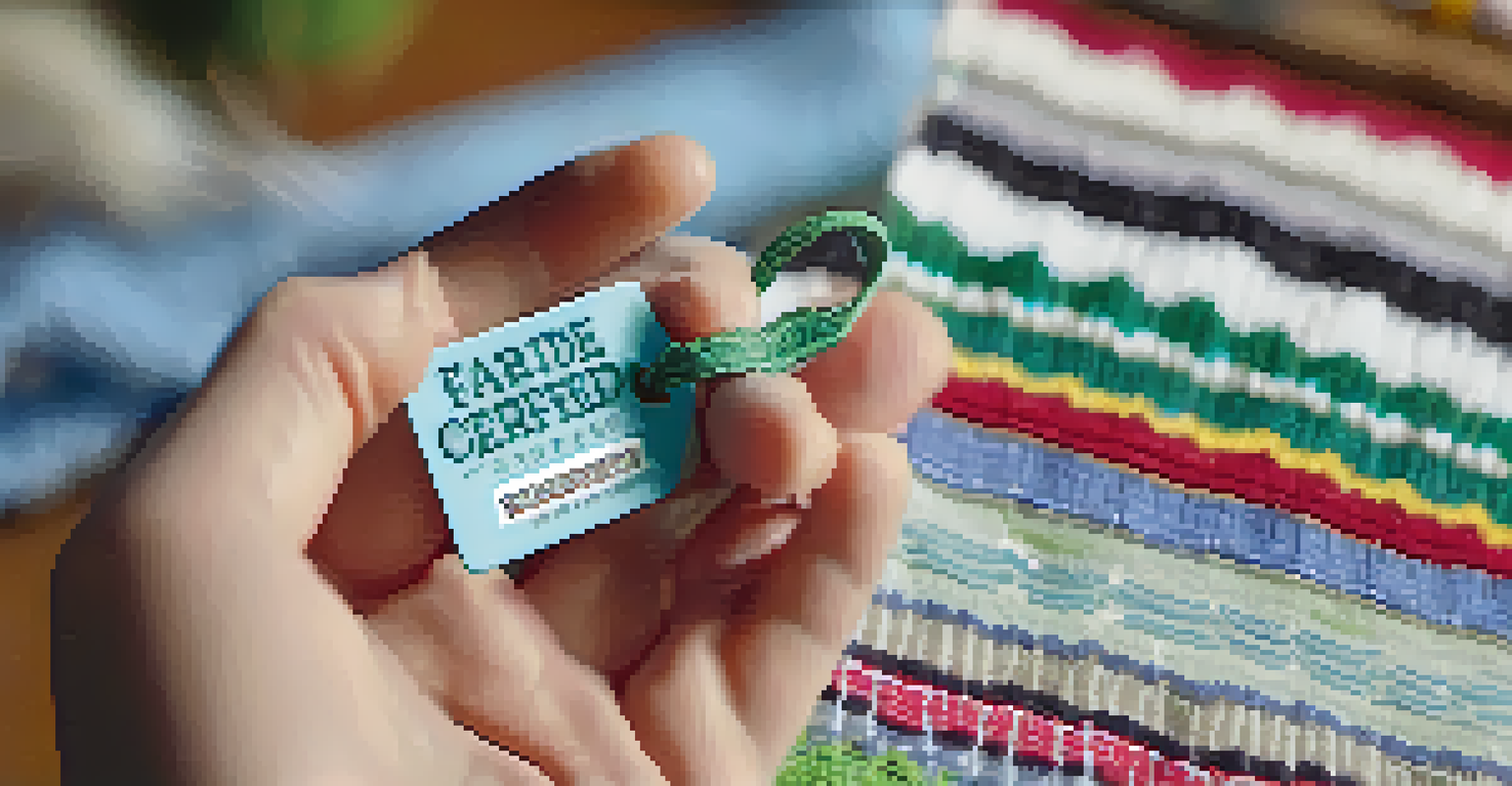Fashion Brands and Fair Trade: A Path Toward Labor Rights

Understanding Fair Trade in the Fashion Industry
Fair trade is all about ensuring that producers receive fair compensation for their work, particularly in developing countries. In the fashion industry, this means that workers who make our clothes are paid a living wage and work in safe conditions. By prioritizing fair trade, brands can help combat poverty and improve the lives of millions of garment workers worldwide.
The greatest danger in times of turbulence is not the turbulence; it is to act with yesterday's logic.
The concept of fair trade extends beyond just wages; it also encompasses environmental sustainability and ethical practices. For example, brands that source organic materials not only support healthier farming practices but also reduce the ecological footprint of their products. This holistic approach to production is essential for the longevity of both the industry and the planet.
Understanding fair trade allows consumers to make informed choices about the brands they support. When shoppers choose fair trade products, they contribute to a cycle of ethical consumption that encourages more brands to adopt these practices. This collective effort can lead to significant changes in the industry, promoting labor rights and environmental stewardship.
The Role of Fashion Brands in Promoting Fair Trade
Fashion brands play a critical role in shaping the landscape of fair trade. By committing to ethical sourcing and transparent supply chains, they can influence industry standards and consumer behavior. Brands that prioritize fair trade not only enhance their reputation but also appeal to a growing market of socially conscious consumers who demand more from their purchases.

For instance, companies like Patagonia and Eileen Fisher are known for their dedication to fair trade practices. These brands have implemented programs that ensure fair wages, safe working conditions, and environmental sustainability. Their success demonstrates that ethical business practices can coexist with profitability, inspiring other brands to follow suit.
Fair Trade Empowers Workers
Fair trade ensures that garment workers receive fair wages and work in safe conditions, significantly improving their quality of life.
Moreover, when fashion brands collaborate with fair trade organizations, they can amplify their impact. Partnerships can lead to innovative solutions for common challenges in the industry, such as identifying ethical suppliers or improving labor conditions. By working together, brands and organizations can create a stronger, more equitable fashion ecosystem.
Consumer Demand for Ethical Fashion Choices
Today's consumers are increasingly aware of the impact their purchasing decisions have on global labor rights. Many shoppers now actively seek out brands that prioritize fair trade and ethical practices. This shift in consumer preference is a powerful driver for change, encouraging brands to adopt more responsible sourcing strategies.
Every time you spend money, you’re casting a vote for the kind of world you want.
A perfect example of this trend is the rise of 'slow fashion,' which emphasizes quality over quantity. Consumers are beginning to recognize that fast fashion contributes to exploitative labor practices and environmental degradation. By choosing to invest in a few high-quality, ethically produced items, shoppers can make a positive statement about their values.
This growing demand for ethical fashion is not just a passing trend; it's a movement. As more consumers educate themselves about the fashion industry's impact on labor rights, they become advocates for change. Their voices can push brands to prioritize fair trade practices, ultimately leading to a more sustainable and equitable industry.
Challenges in Implementing Fair Trade Practices
While the movement toward fair trade is gaining momentum, there are still significant challenges to overcome. One major hurdle is the complexity of global supply chains, which often obscure the conditions under which garments are produced. Brands may find it difficult to ensure that every step of their supply chain adheres to fair trade standards.
Additionally, some brands may face resistance to change from manufacturers who prioritize cost over ethics. This resistance can stem from a lack of awareness about the benefits of fair trade or a fear that implementing ethical practices will increase production costs. Overcoming these obstacles requires commitment and collaboration among all stakeholders in the fashion industry.
Consumer Demand Drives Change
Growing consumer awareness and preference for ethical fashion are pushing brands to adopt fair trade practices and responsible sourcing.
Despite these challenges, many brands are finding creative solutions to implement fair trade practices. By investing in training and support for suppliers, they can foster a culture of ethical production. This proactive approach not only benefits workers but also positions brands as leaders in the movement toward greater labor rights.
Success Stories of Fair Trade Fashion Brands
Numerous fashion brands have successfully embraced fair trade practices, setting examples for others to follow. For instance, the brand People Tree has been a pioneer in sustainable and fair trade fashion since the 1990s. Their commitment to ethical production has earned them a loyal customer base and recognition in the industry.
Another inspiring example is TenTree, a company that plants ten trees for every item sold, contributing to reforestation while also ensuring fair wages for workers. Their dual focus on environmental sustainability and labor rights resonates with consumers who want to make a positive impact with their purchases.
These success stories illustrate that fair trade is not just a niche market; it represents a viable business model that can lead to profitability and growth. By showcasing the benefits of ethical practices, these brands inspire others to consider fair trade as a key component of their business strategies.
The Impact of Fair Trade on Labor Rights
Implementing fair trade practices has a profound impact on labor rights around the globe. By ensuring that workers are paid fairly and treated with respect, brands can help elevate the standard of living for countless individuals. This not only improves the quality of life for workers but also empowers communities to thrive.
Fair trade certification also provides a framework for monitoring and enforcing labor rights. Organizations that oversee fair trade practices conduct regular audits and assessments to ensure compliance with ethical standards. This oversight helps hold brands accountable and fosters transparency in the supply chain.
Collaboration Enhances Impact
Partnerships between fashion brands and fair trade organizations lead to innovative solutions and a stronger commitment to ethical practices in the industry.
As more brands adopt fair trade principles, the collective impact on labor rights becomes increasingly significant. This shift can lead to systemic changes in the industry, promoting better working conditions and fair wages for all workers, regardless of where they are in the supply chain.
Future Trends in Fair Trade Fashion
Looking ahead, the future of fair trade in fashion appears promising. As consumer awareness grows, brands will likely continue to prioritize ethical practices and transparency. Innovations in technology, such as blockchain, can further enhance traceability in supply chains, making it easier for consumers to verify fair trade claims.
Moreover, collaborations between brands and fair trade organizations can lead to the development of new standards and best practices. These partnerships can drive innovation and create a more unified approach to ethical sourcing in the fashion industry. As a result, more brands may begin to adopt fair trade principles as a core aspect of their identity.

Ultimately, the movement toward fair trade fashion is about creating a more just and equitable industry. As brands, consumers, and organizations work together to champion labor rights, we can envision a future where fashion not only looks good but also does good. This vision of ethical fashion is within reach, and it starts with each of us making informed choices.